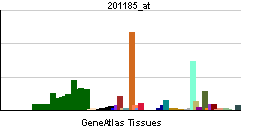HTRA1
| HtrA serine peptidase 1 | |||||||||||
|---|---|---|---|---|---|---|---|---|---|---|---|
| Identifiers | |||||||||||
| Symbols | HTRA1 ; HtrA; L56; ORF480; PRSS11 | ||||||||||
| External IDs | Template:OMIM5 Template:MGI HomoloGene: 31114 | ||||||||||
| |||||||||||
| RNA expression pattern | |||||||||||
 | |||||||||||
| More reference expression data | |||||||||||
| Orthologs | |||||||||||
| Template:GNF Ortholog box | |||||||||||
| Species | Human | Mouse | |||||||||
| Entrez | n/a | n/a | |||||||||
| Ensembl | n/a | n/a | |||||||||
| UniProt | n/a | n/a | |||||||||
| RefSeq (mRNA) | n/a | n/a | |||||||||
| RefSeq (protein) | n/a | n/a | |||||||||
| Location (UCSC) | n/a | n/a | |||||||||
| PubMed search | n/a | n/a | |||||||||
HtrA serine peptidase 1, also known as HTRA1, is a human gene.[1]
This gene encodes a member of the trypsin family of serine proteases. This protein is a secreted enzyme that is proposed to regulate the availability of insulin-like growth factors (IGFs) by cleaving IGF-binding proteins. It has also been suggested to be a regulator of cell growth.[1]
References
Further reading
- Zurawa-Janicka D, Narkiewicz J, Lipińska B (2007). "[Characterization of the HtrA family of proteins]". Postepy Biochem. 53 (1): 27–36. PMID 17718385.
- Andersson B, Wentland MA, Ricafrente JY; et al. (1996). "A "double adaptor" method for improved shotgun library construction". Anal. Biochem. 236 (1): 107–13. doi:10.1006/abio.1996.0138. PMID 8619474.
- Zumbrunn J, Trueb B (1997). "Primary structure of a putative serine protease specific for IGF-binding proteins". FEBS Lett. 398 (2–3): 187–92. PMID 8977104.
- Yu W, Andersson B, Worley KC; et al. (1997). "Large-scale concatenation cDNA sequencing". Genome Res. 7 (4): 353–8. PMID 9110174.
- Zumbrunn J, Trueb B (1998). "Localization of the gene for a serine protease with IGF-binding domain (PRSS11) to human chromosome 10q25.3-q26.2". Genomics. 45 (2): 461–2. doi:10.1006/geno.1997.4953. PMID 9344681.
- Hu SI, Carozza M, Klein M; et al. (1999). "Human HtrA, an evolutionarily conserved serine protease identified as a differentially expressed gene product in osteoarthritic cartilage". J. Biol. Chem. 273 (51): 34406–12. PMID 9852107.
- Baldi A, De Luca A, Morini M; et al. (2002). "The HtrA1 serine protease is down-regulated during human melanoma progression and represses growth of metastatic melanoma cells". Oncogene. 21 (43): 6684–8. doi:10.1038/sj.onc.1205911. PMID 12242667.
- Strausberg RL, Feingold EA, Grouse LH; et al. (2003). "Generation and initial analysis of more than 15,000 full-length human and mouse cDNA sequences". Proc. Natl. Acad. Sci. U.S.A. 99 (26): 16899–903. doi:10.1073/pnas.242603899. PMID 12477932.
- Nie GY, Hampton A, Li Y; et al. (2003). "Identification and cloning of two isoforms of human high-temperature requirement factor A3 (HtrA3), characterization of its genomic structure and comparison of its tissue distribution with HtrA1 and HtrA2". Biochem. J. 371 (Pt 1): 39–48. doi:10.1042/BJ20021569. PMID 12513693.
- De Luca A, De Falco M, Severino A; et al. (2003). "Distribution of the serine protease HtrA1 in normal human tissues". J. Histochem. Cytochem. 51 (10): 1279–84. PMID 14500695.
- Ota T, Suzuki Y, Nishikawa T; et al. (2004). "Complete sequencing and characterization of 21,243 full-length human cDNAs". Nat. Genet. 36 (1): 40–5. doi:10.1038/ng1285. PMID 14702039.
- Chien J, Staub J, Hu SI; et al. (2004). "A candidate tumor suppressor HtrA1 is downregulated in ovarian cancer". Oncogene. 23 (8): 1636–44. doi:10.1038/sj.onc.1207271. PMID 14716297.
- Oka C, Tsujimoto R, Kajikawa M; et al. (2004). "HtrA1 serine protease inhibits signaling mediated by Tgfbeta family proteins". Development. 131 (5): 1041–53. doi:10.1242/dev.00999. PMID 14973287.
- Colland F, Jacq X, Trouplin V; et al. (2004). "Functional proteomics mapping of a human signaling pathway". Genome Res. 14 (7): 1324–32. doi:10.1101/gr.2334104. PMID 15231748.
- Grau S, Baldi A, Bussani R; et al. (2005). "Implications of the serine protease HtrA1 in amyloid precursor protein processing". Proc. Natl. Acad. Sci. U.S.A. 102 (17): 6021–6. doi:10.1073/pnas.0501823102. PMID 15855271.
- Ozturk A, Desai PP, Minster RL; et al. (2005). "Three SNPs in the GSTO1, GSTO2 and PRSS11 genes on chromosome 10 are not associated with age-at-onset of Alzheimer's disease". Neurobiol. Aging. 26 (8): 1161–5. doi:10.1016/j.neurobiolaging.2004.11.001. PMID 15917099.
- Grau S, Richards PJ, Kerr B; et al. (2006). "The role of human HtrA1 in arthritic disease". J. Biol. Chem. 281 (10): 6124–9. doi:10.1074/jbc.M500361200. PMID 16377621.
- Bowden MA, Di Nezza-Cossens LA, Jobling T; et al. (2006). "Serine proteases HTRA1 and HTRA3 are down-regulated with increasing grades of human endometrial cancer". Gynecol. Oncol. 103 (1): 253–60. doi:10.1016/j.ygyno.2006.03.006. PMID 16650464.
- Chien J, Aletti G, Baldi A; et al. (2006). "Serine protease HtrA1 modulates chemotherapy-induced cytotoxicity". J. Clin. Invest. 116 (7): 1994–2004. doi:10.1172/JCI27698. PMID 16767218.
- Dewan A, Liu M, Hartman S; et al. (2006). "HTRA1 promoter polymorphism in wet age-related macular degeneration". Science. 314 (5801): 989–92. doi:10.1126/science.1133807. PMID 17053108.
| This protein-related article is a stub. You can help Wikipedia by expanding it. |